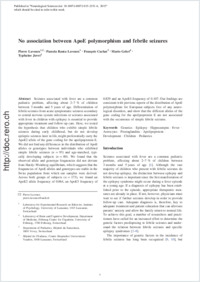No association between ApoE polymorphism and febrile seizures
- Lavenex, Pierre Laboratory for Experimental Research on Behavior, Institute of Psychology, University of Lausanne, Switzerland - Laboratory of Brain and Cognitive Development, Department of Medicine, Fribourg Center for Cognition, University of Fribourg, Switzerland
- Lavenex, Pamela Banta Laboratory for Experimental Research on Behavior, Institute of Psychology, University of Lausanne, Switzerland
- Cachat, François Department of Pediatrics, Hôpital du Samaritain, Vevey, Switzerland
- Gehri, Mario Hôpital de l’Enfance, Centre Hospitalier Universitaire Vaudois, Lausanne, Switzerland
- Juvet, Typhaine Laboratory of Brain and Cognitive Development, Department of Medicine, Fribourg Center for Cognition, University of Fribourg, Switzerland
-
02.08.2015
Published in:
- Neurological Sciences. - 2015, p. 1–6
Genetics
Epilepsy
Hippocampus
Fever
Astrocytes
Prostaglandins
Apolipoprotein
Development
Children
Pediatrics
English
Seizures associated with fever are a common pediatric problem, affecting about 2–7 % of children between 3 months and 5 years of age. Differentiation of febrile seizures from acute symptomatic seizures secondary to central nervous system infections or seizures associated with fever in children with epilepsy is essential to provide appropriate treatment and follow-up care. Here, we tested the hypothesis that children who exhibit simple febrile seizures during early childhood, but do not develop epileptic seizures later in life, might preferentially carry the ApoE2 allele of the gene coding for the apolipoprotein E. We did not find any differences in the distribution of ApoE alleles or genotypes between individuals who exhibited simple febrile seizures (n = 93) and age-matched, typically developing subjects (n = 80). We found that the observed allele and genotype frequencies did not deviate from Hardy–Weinberg equilibrium, which suggests that the frequencies of ApoE alleles and genotypes are stable in the Swiss population from which our samples were derived. Across both groups of subjects (n = 173), we found an ApoE2 allele frequency of 0.064, an ApoE3 frequency of 0.829 and an ApoE4 frequency of 0.107. Our findings are consistent with previous reports of the distribution of ApoE polymorphism for European subjects free of any neurological disorders, and show that the different alleles of the gene coding for the apolipoprotein E are not associated with the occurrence of simple febrile seizures.
- Faculty
- Faculté des sciences et de médecine
- Department
- Département de Médecine
- Language
-
- English
- Classification
- Biological sciences
- License
-
License undefined
- Identifiers
-
- RERO DOC 257270
- DOI 10.1007/s10072-015-2351-6
- Persistent URL
- https://folia.unifr.ch/unifr/documents/304571
Statistics
Document views: 146
File downloads:
- pdf: 179
